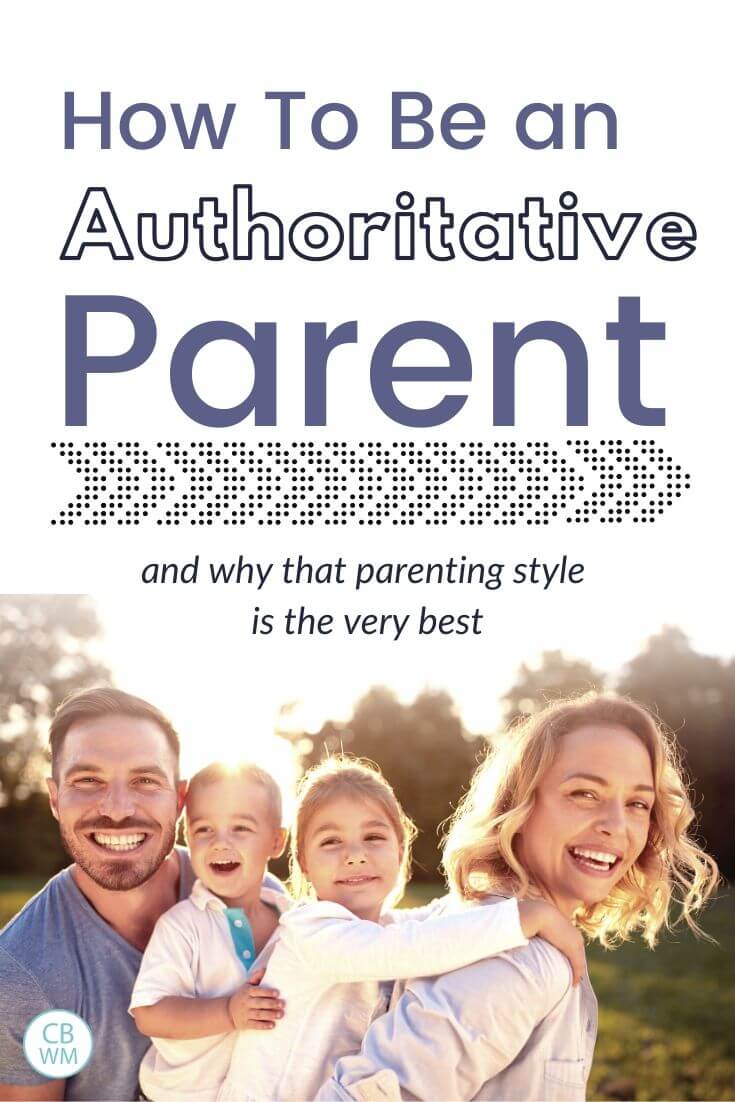The authoritative parenting style is the very best parenting style out there. Find out why and how to be an authoritative parent.

Did you know that among the four different parenting styles, research has shown one is superior over the other three?
The ideal parenting style to be is an authoritative parent. This style consistently raises children who are happy, well-adjusted, kind, and successful and this continues on into adulthood.
Post Contents
- What Are the Characteristics of an Authoritative Parent
- What Are the Effects of Authoritative Parenting
- How to Be an Authoritative Parent
- Have Clear Rules
- Be Consistent
- Use Logical Consequences
- Understand Discipline Goals
- Validate Emotions
- Listen to Your Child
- Explain the “Why”
- Use Rewards to Establish Habits
- Allow Freedoms and Choices as Appropriate
- Expect Responsibility
- Show Love
- Conclusion
- Related Posts
What Are the Characteristics of an Authoritative Parent
An authoritative parent is someone who has high expectations for her children but is also very warm and involved in her kids’ lives. Authoritative parents set limits with clear expectations. They outline consequences, enforce boundaries and rules, and are consistent.
Authoritative parents are a “moderate” parenting style. They are not the strict “do as I say or else” type that the authoritarian is and they are not the “you decide and I will follow” type that is the permissive parent.
Read: Understanding the 4 Types of Parenting Styles
What Are the Effects of Authoritative Parenting
What makes authoritative parenting so good?
Studies have shown measurable differences in children with the various parenting styles as young as preschool. Children raised with authoritative parents are typically happy, content, independent and self-reliant. They tend to have good social skills and are good at controlling themselves and their emotions. They are kind and cooperative with their peers. They are competent and assertive and can face new situations without fear.
As the children get older, they have great academic success and are involved in school. They feel good about themselves and tend to have lower rates of depression and anxiety. There is less drug and alcohol use among these children.

How to Be an Authoritative Parent
These effects all sound pretty amazing, right? These are the skills we all hope our children can develop as they grow and mature. A great thing about this parenting style is that you can change a lot of things to address the individual needs of each of your children. Authoritative is a parenting style. Your exact practices or methods can vary greatly and still be within this style.
Here are the areas to focus on to be an authoritative parent yourself.
Have Clear Rules
Set clear rules and boundaries for your children. Children feel secure when they know what is expected, what they can expect, and what their boundaries are.
Sit down and think through what is okay and what isn’t okay. Explain the rules you have set. Use if/then statements when explaining rules.
Do not repeat yourself over and over again. Make your consequences immediate.
One note, it is okay for a “consequence” you have at minor infractions be a warning. This is where some balance and moderation come in. Authoritarian parenting is very black and white. You make a mistake, you get punished.
Authoritative, on the other hand, can apply some grace and mercy to situations. Be sure you are consistent with this grace and mercy. You can even set some clear expectations for when grace and mercy will be applied and when it will not.
One great measuring stick is childishness vs. foolishness. A child is childish when he does something he shouldn’t but he doesn’t know better. Foolishness is doing something he shouldn’t but he does know better. Read more about childishness vs. foolishness and how to respond to each situation here.
Another example is when your child forgets something at home that she needs for school. Authoritarian would never bring the forgotten item. Permissive would bring it every time.
Authoritative finds a middle ground. My rule is I will bring it if the child rarely forgets something and if I am able to bring it. If I have a meeting or something else planned, I just can’t get it there and that is a natural consequence (read more on that below).
If it becomes a pattern and the child often forgets things at home, I let the child know it will be the last time I bring something. Read more about this in my post Should Your Bail Your Child Out?
Be Consistent
One of the most important elements to being an authoritative parent is being consistent. Be consistent in enforcing limits and discipline. Do not be authoritarian (letter of the law) one day and permissive the next. Be consistent in what you expect and how you expect it. Be consistent in how you respond when expectations and rules are not met.
Follow through on your rules. This is important in being consistent. There is no point in having a rule if you do not enforce the rule.
Use Logical Consequences
Logical consequences are a super effective form of correction. Real life has real consequences, and allowing these consequences to take their natural course can be very motivating for kids to learn to be responsible and respect rules.
Read: Benefits of Teaching Consequences
One of my favorite resources for understanding logical consequences is Parenting with Love and Logic. Read all about that here.
Some parents really struggle with allowing consequences to happen to their children. They hate to see their child suffer and want to save them. They feel like big jerks for allowing their child to feel sad or disappointed if they could have stopped it. They worry their child will never learn compassion.
Read up on Natural Consequences vs. Grace in this post.
When you enforce consequences, give a clear timeline with your consequence. Do not take something away indefinitely or until your child has reached some arbitrary state. Does this sound familiar? “You can have the keys back when I can trust you.” When exactly is that trust? Again, set clear rules and expectations. Give your child clear steps and expectations that need to be met.
Read: 10 Guidelines for Using Logical Consequences
Understand Discipline Goals
When you discipline your child, the point is to help your child change. You want to use discipline to help your child change behavior and grow to be a better person. The point is not punishment.
Do not shame your child when you correct him. Do not guilt your child when you correct him. You want your child to learn from his mistakes so he can intrinsically change and grow. You do not want him avoiding actions simply to avoid punishment.
Validate Emotions
Children have emotions. Humans have emotions and children are young humans.
Allow your children to have emotion. That doesn’t mean you have to allow your child to do whatever he wants because he is feeling emotional (that would be permissive parenting style).
But you do not tell your child not to cry or not to feel upset. That is the authoritarian parenting style.
You want to correct the behavior, not the emotion.
It is okay that your child feels sad. It isn’t okay that he hit someone because of it. It is okay he is disappointed. It isn’t okay to stomp, scream, and yell because of it.
Acknowledge the emotion you see your child having. So many times, people will calm down if their emotion is validated. “I can see you are feeling really disappointed that you can’t watch more television right now.”
Help your child learn to identify and label the emotions being felt. Ask about the feelings and talk about them. Teach your child to recognize emotions–this is better done in times of non-conflict.
Read: How To Help Your Child Work Through Emotions
Listen to Your Child
To be a warm parent who has a good relationship with your child, you need to be willing to listen to your child.
You need to start in the young years. If you are past the young years, start where you are, but if you are in the young years, listen now! Listen to every detail about that My Little Pony castle she has been wanting or all about his weird dream last night.
You are teaching your child that you will listen when they want to talk.
Another facet of listening is to be open minded. If your child comes to you with a concern about a rule or consequence in your home, listen to what your child has to say. This doesn’t mean you have to change because your child isn’t happy. That would be permissive parenting.
But you also shouldn’t just bark “Well this is my house so you will do what I say!” that is authoritarian parenting.
You listen. You consider. You are still the parent, so you still decide. But you show respect and consideration for your child’s thoughts.
Explain the “Why”
Along those same lines, you want to explain “why” to your child. Why do you have the rules and expectations you do?
We often tell our kids that our job is to raise them to be responsible adults who are kind and good, functioning citizens. We sometimes need to enforce consequences to help them learn to become the best version of themselves they can be. They need to learn, and our job is to teach them.
I have explained to my children that they only have one mom and one dad. We have to be that for them.
They get it.
If you have a child who is logical, explaining the why will be well-received and “because I said so” will be very frustrating.
Read: Teach “Why”
Use Rewards to Establish Habits
Be patient with your child as she learns to do new things. You can’t expect her to perform perfectly just because you told her how once.
Rewards can be a very effective way to change behavior.
You might do a sticker chart when you are helping your child form a new habit or master a new skill. Sticker charts are popular for potty training and for doing chores.
You might set up a system to help your child earn a privilege. This can be helpful if your child often shirks duties to go for doing something fun or if your child needs help learning to be responsible.
Try to focus on positive instead of negative. If your child has a hard time taking a shower faster than 30 minutes, you can set a timer and say “If you make it out by the time the timer goes off, you will be able to earn television time today.” The negative side of that would be, “If you can’t get out of the shower before this goes off, you lose television time today.”
Same action and same result. Different delivery.
Allow Freedoms and Choices as Appropriate
Your child is growing toward becoming an adult. She must learn how to make choices and how to accept the consequences for those choices.
Give your child freedoms as age-appropriate. This can be hard to know for sure and may need some trial and error. This type of parenting is often described as parenting in the funnel. You keep your child where she can handle it. You do not keep her behind and you do not allow more than she should.
Here are some posts on the topic to help you out:
- How Too Many Freedoms Leads to Disobedience
- How To Know What Freedoms to Give Baby
- Wise In Your Own Eyes Explained
- How To Keep Siblings in the Funnel
Expect Responsibility
With those freedoms come responsibilities. To raise children who are successful and responsible as we talked about above, they need to learn to be responsible.
This will take time, learning, and practice. As the parent, you need to teach your child life skills needed to be responsible. If your child can’t remember to get things done, help him create a checklist and teach him to go through it to make sure he has everything done.
You could also make a flipchart for your child. I have loved this for my kids with their morning routines when they are young and need help learning to be responsible for getting ready in the morning. You can see my Printable Morning Routine Cards for Kids here.
Show Love
The authoritative parenting style is one marked by a parent who has high involvement along with the high expectations. High involvement means you are warm and loving. Authoritative parents show love to their children.
An important facet of showing children love is to figure out their love language and appeal to that. Read up on How and Why of Knowing Our Children’s Love Languages and Identifying Your Child’s Primary Love Language for help on this.

Conclusion
Diana Baumrind, a clinical developmental psychologist known for her research on parenting styles, labeled the authoritative parenting style as “just right.” The parent is firm but not rigid. The parent will make exceptions when the situation warrants it.
The authoritative parenting style allows you to make adjustments for your individual child as needed. Find that middle ground to help you have a peaceful family life at home. You can easily see why this parenting style is so successful when you read through the “how”

Hello! I just want to let you know that God loves you and that I appreciate this post that you made. It has really helped me see what I need to learn to change as a parent.
Thank you! That is very kind of you.